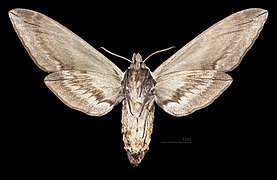Sphinx drupiferarum
Appearance
| Wild cherry sphinx | |
|---|---|

| |
| Sphinx drupiferarum' | |

| |
| Sphinx drupiferarum ♂ △ | |
| Scientific classification | |
| Domain: | Eukaryota |
| Kingdom: | Animalia |
| Phylum: | Arthropoda |
| Class: | Insecta |
| Order: | Lepidoptera |
| Family: | Sphingidae |
| Genus: | Sphinx |
| Species: | S. drupiferarum
|
| Binomial name | |
| Sphinx drupiferarum J. E. Smith, 1797
| |
| Synonyms | |
| |
Sphinx drupiferarum, the wild cherry sphinx, is a moth of the family Sphingidae. The species was first described by James Edward Smith in 1797.[1]
Distribution
It is found from the temperate parts of the United States to southern Canada.[2]
Description
The wingspan is 75–115 mm. In Canada, there is one generation per year with adults on wing from June to July. In the south, there are two generations per year.
-
Sphinx drupiferarum ♀
-
Sphinx drupiferarum ♀ △
Biology
The larvae feed on Prunus (including Prunus serotina), Malus, Syringa vulgaris, Amelanchier nantuckensis and Celtis occidentalis.
References
- ^ "CATE Creating a Taxonomic eScience - Sphingidae". Cate-sphingidae.org. Retrieved 2011-11-01.[permanent dead link]
- ^ "Silkmoths". Silkmoths.bizland.com. Archived from the original on 2015-03-13. Retrieved 2011-11-01.
External links
Wikispecies has information related to Sphinx drupiferarum.
- "Wild cherry sphinx (Sphinx drupiferarum)". Moths of North America. U.S. Geological Survey Northern Prairie Wildlife Research Center. August 30, 2005.
- Fauske, Gerald M. (January 23, 2007). "Sphinx drupiferarum J. E. Smith 1797". Moths of North Dakota. Department of Entomology North Dakota State University. Retrieved December 13, 2020.


